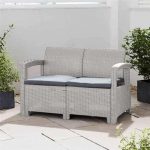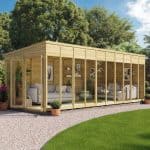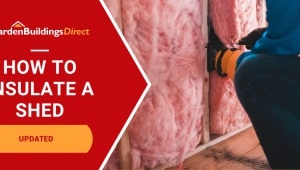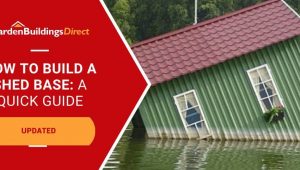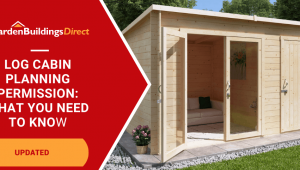Jump to:
With their sleek designs and modern appeal, metal summerhouses are making a name. But as the seasons change and weather patterns become unpredictable, one question arises. Are metal summer houses truly weatherproof?
While metal structures are durable, there are factors that affect this ability. In this blog, we will uncover the truth about their weatherproofing capabilities. This guide can be a great help if you’re considering or already own one, so keep reading!
Metal Summerhouses
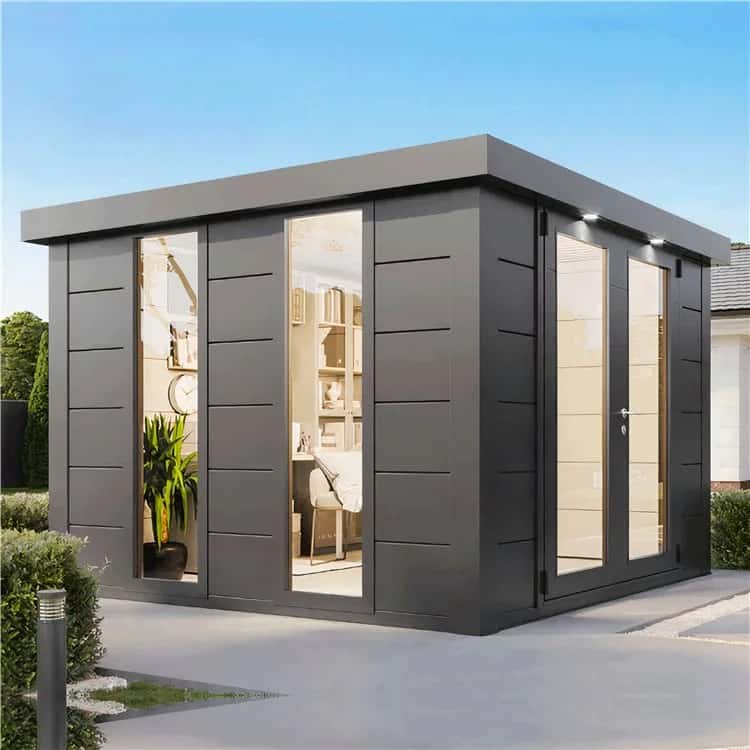
A metal summer house is an outdoor structure constructed using materials such as steel or aluminium. They offer a range of advantages that make them popular among homeowners.
To start, metal summerhouses are highly durable. They can withstand harsh weather conditions, including heavy rain, snow, and strong winds. They are resistant to rot, pests, and fire, ensuring long-term structural integrity. Additionally, metal structures require minimal maintenance, making them a more convenient choice.
When it comes to the types of metals commonly used, steel and aluminium are the most popular choices. Steel is known for its strength and robustness, providing excellent structural support. Aluminium, in contrast, is lightweight, corrosion-resistant, and easy to handle during construction.
Despite their inherent durability, metal summerhouses still require weatherproofing measures. This is because, without appropriate weatherproofing, metal structures can be susceptible to issues. These include the following:
- condensation
- expansion and contraction due to temperature changes
- heat insulation concerns
Weatherproofing helps to enhance their resistance to moisture, prevent leaks and control temperature. What’s more, to ensure a comfortable and protected space within the summerhouse.
Factors Affecting Weatherproofing
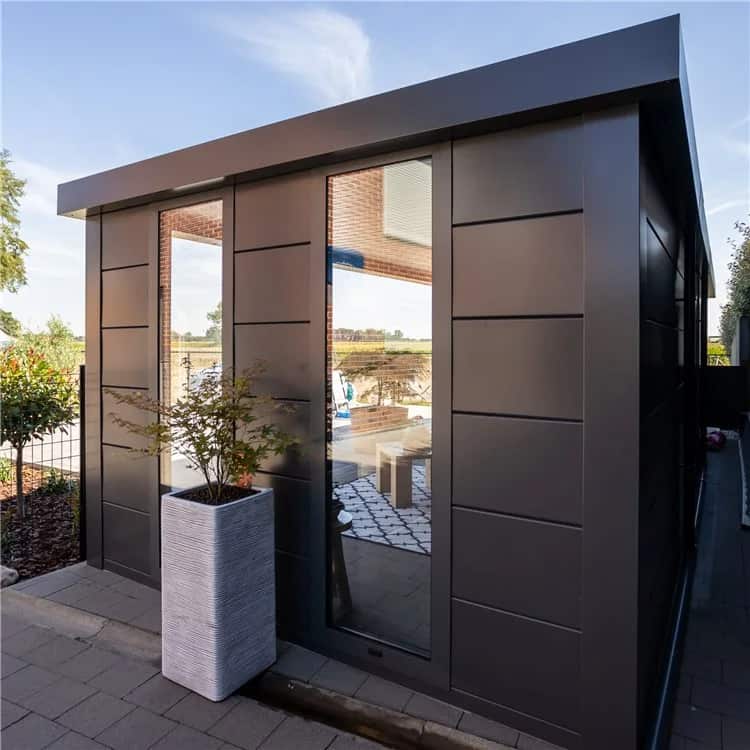
When weatherproofing a metal summerhouse, several factors determine its effectiveness:
1. Metal quality and thickness
The quality and thickness of the metal are key to its weatherproofing capabilities. Take galvanised steel or aluminium alloys, for instance. Such high-quality metals offer better resistance to corrosion and rust. This ensures the longevity of the structure.
Additionally, thicker metal panels provide enhanced durability. Plus, double protection against external elements like heavy rain or hail.
2. Coatings and finishes
The application of coatings and finishes on the metal surface contributes to weatherproofing. Protective coatings create a barrier that shields the metal from moisture, and UV rays, to name a few.
Weather-resistant paint or powder coatings are often the best bet. These coatings prevent rust formation, minimise fading, and extend longevity.
3. Sealing and insulation
Proper sealing and insulation are also vital. Sealing gaps and joints helps prevent water infiltration, drafts, and heat loss. Insulation materials, such as foam or fibreglass, improve the following:
- thermal efficiency
- regulate temperature
- reduce condensation buildup
They create a barrier against extreme temperature fluctuations and enhance the overall comfort.
Each factor mentioned above directly influences the overall weatherproofing effectiveness of metal summerhouses. Neglecting them may result in issues like:
- water leaks
- rusting
- excessive condensation
- poor temperature control
So consider these factors when purchasing or maintaining a metal summerhouse!
Pros and Cons
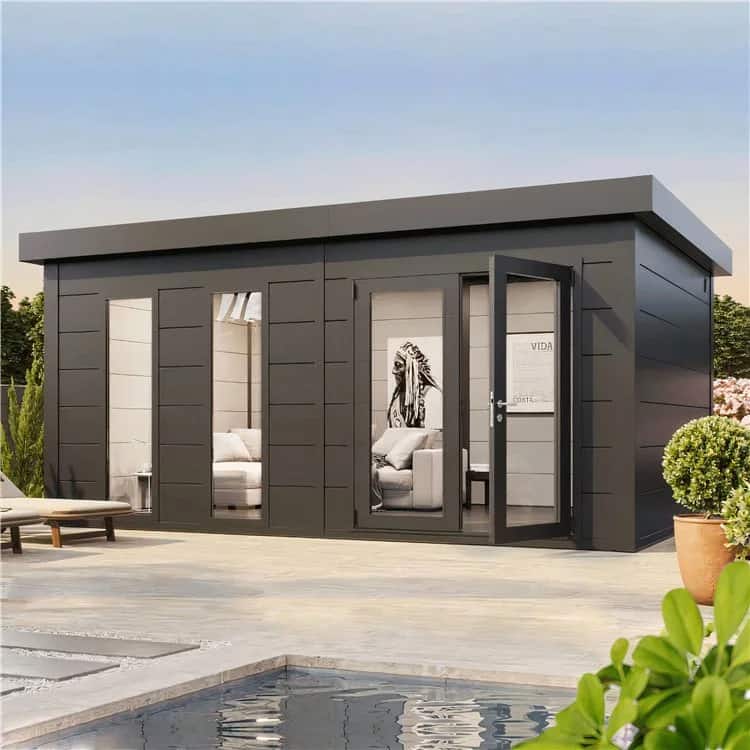
Advantages of metal summerhouses in terms of weatherproofing:
Resistance to rot, pests, and fire
Unlike wooden structures, metal doesn’t decay, eliminating the risk of rot. Additionally, metal is not susceptible to termite or insect infestations. Moreover, metal summerhouses offer a higher level of fire resistance, providing added safety.
Durability in harsh weather conditions
Galvanised steel or aluminium alloys are engineered to be strong and sturdy. They can endure heavy rain, snow, strong winds, and even hail without damage. Metal structures are less likely to warp, crack, or degrade over time, to add. Such qualities guarantee long-term weatherproofing and structural integrity.
Low maintenance requirements
Metal doesn’t require painting or staining to maintain its weatherproofing properties. Periodic inspections and simple cleaning routines will do the magic.
Potential drawbacks or challenges faced by metal summerhouses regarding weatherproofing:
Condensation issues
Metal has a higher likelihood of experiencing condensation buildup. This is mainly due to temperature differentials between the interior and exterior surfaces. Without proper ventilation and insulation, condensation can lead to mould, mildew, and corrosion. Proper measures such as ventilation and moisture control are necessary.
Expansion and contraction due to temperature changes
These issues can impact their weatherproofing effectiveness. Over time, the thermal movement may create gaps that allow water infiltration. Proper sealing techniques and flexible joint systems can help accommodate potential leaks.
Heat insulation concerns
Metal is an excellent conductor of heat, which can pose insulation challenges. Without insulation, metal summerhouses may be prone to heat loss during colder months. Meanwhile, an excessive heat gain during hotter seasons.
Incorporate insulation materials within the walls, roof, and floor. Doing so will help regulate the internal temperature and improve energy efficiency.
Round-up
Metal summerhouses, especially ones from Telluria, can be weatherproof when appropriate measures are taken. Yet, some factors can influence their weatherproofing effectiveness, including:
- metal quality
- coatings
- sealing
- insulation
- ventilation
Regular maintenance is key to preserving their weatherproofing capabilities over time. With the right precautions, you can enjoy a weatherproof haven in your outdoor space.



